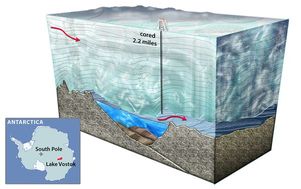Ruskies Drill into Ancient Sub-Glacial Antarctic Lake

Marc Roussy
The St. Petersburg Arctic and Antarctic Research Institute confirmed that it has drilled into an ancient sub-glacial lake. The Russian team drilled down 3,769.2 meters to reach the more than one million year old Lake Vostok’s surface on February 5 at 8:25 pm. Russian Minister of Natural Resources Yury Trutnev was on-site to witness this momentous event.
The 33 scientists hope to discover long lost forms of life trapped in this ecosystem and get a snapshot of what much of the world looked like in our last glacial maximum. If life were found, this would also raise more questions as to the possibility of life on Jupiter’s moon, Europa. Until the 1970’s, scientists believed that life was dependent on energy derived from the Sun. However, since the discovery of hydrothermal vents, life on Europa is a distinct possibility.
Trutnev returned to Moscow on Friday to deliver a flask labeled: “Lake Vostok, more than million years old, depth 3,769.3 meters, 5.12.11, Antarctic” to Vladimir Putin. “Dinosaurs and Turnev both drank it,” joked Putin insinuating that Turnev couldn’t help but sneak a swig out of the flask. David Pearce of the British Antarctic Survey hopes to collect samples from another sub-glacial lake, Lake Ellsworth in West Antarctic and a U.S. team is attempting to reach a deep ice-stream in the region.
The St. Petersburg Arctic and Antarctic Research Institute confirmed that it has drilled into an ancient sub-glacial lake. The Russian team drilled down 3,769.2 meters to reach the more than one million year old Lake Vostok’s surface on February 5 at 8:25 pm. Russian Minister of Natural Resources Yury Trutnev was on-site to witness this momentous event.
The 33 scientists hope to discover long lost forms of life trapped in this ecosystem and get a snapshot of what much of the world looked like in our last glacial maximum. If life were found, this would also raise more questions as to the possibility of life on Jupiter’s moon, Europa. Until the 1970’s, scientists believed that life was dependent on energy derived from the Sun. However, since the discovery of hydrothermal vents, life on Europa is a distinct possibility.
Trutnev returned to Moscow on Friday to deliver a flask labeled: “Lake Vostok, more than million years old, depth 3,769.3 meters, 5.12.11, Antarctic” to Vladimir Putin. “Dinosaurs and Turnev both drank it,” joked Putin insinuating that Turnev couldn’t help but sneak a swig out of the flask. David Pearce of the British Antarctic Survey hopes to collect samples from another sub-glacial lake, Lake Ellsworth in West Antarctic and a U.S. team is attempting to reach a deep ice-stream in the region.
